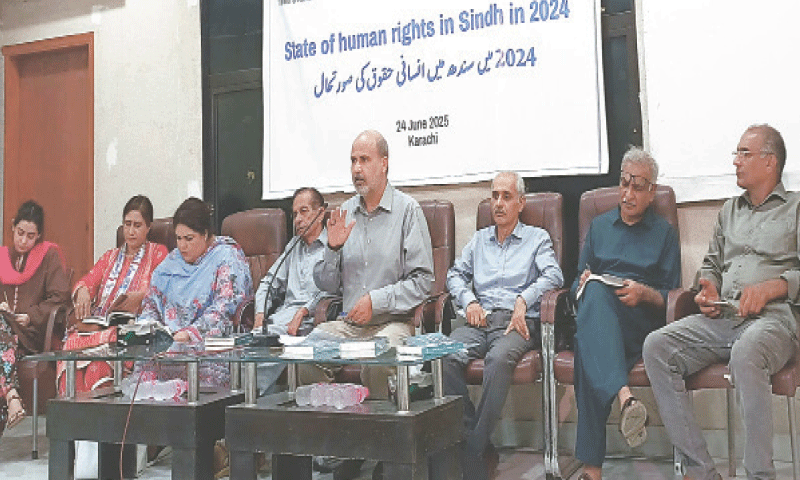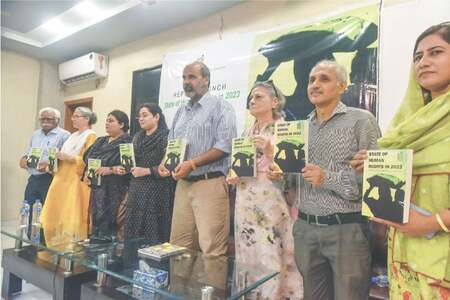KARACHI: The Sindh launch of the Human Rights Commission of Pakistan’s annual report, State of Human Rights in 2024, was held at the Karachi Press Club on Tuesday.
The report flags many alarming trends in law & order and civil liberties in Sindh during the course of the last year.
Highlighting some of the human rights violations from the report, HRCP Sindh Vice Chairman Qazi Khizar said that 2024 was a bad year for citizens, especially the downtrodden people. Not just the rights of religious minorities, women, children, workers and activists were violated, but also there was political manipulation in the general elections, as well as a rise in crime and migrations.
“Besides all these things, people at large felt a financial crunch; religious minorities, especially folks from the Hindu community, migrated in huge numbers; and the number of enforced disappearances grew further,” said Qazi Khizar. “The common thing in all the people who disappeared was that they questioned the wrongs. When the state has no answers to their questions, these people are made to disappear,” he added.
“Hidayat Lohar, a prominent educator and human rights defender, was gunned down on February 16, 2024. His assailants are clearly visible in the CCTV footage, but they are still at large even after a year now. Earlier, he was abducted twice, in 2017 and 2023, and those who kidnapped him are also known as they left behind clues to reach them which included a wallet with CNIC, but no one was caught,” he pointed out.
Other issues highlighted in the report are: 98.79pc peasant women in Sindh not having ownership of land; the extrajudicial killing of Dr Shahnawaz Kumbhar, who was accused of blasphemy; police crackdown on the participants of ‘Sindh Rawadari March’ in Karachi; HRCP Chairman Asad Iqbal Butt being picked up by police in a raid on his residence; Sammi Deen Baloch’s detention at airport and barring her from traveling abroad; overpopulated jails; failure in restoring students union, the growing number of out-of-school children and suicides in Tharparkar.
Senior journalist and activist Sohail Sangi drew attention to media workers facing hassles in getting their salaries on time or getting deprived of their jobs altogether. “There is no social security, no job security as the government fails to do anything about it,” he said. “With so much insecurity in the media, the voice of reason is being stopped from reaching the masses,” he added.
Activist Sadia Baloch regretted the lack of data. “The data that we gather comes from second sources such as newspapers,” she said. “So many women here are murdered in the name of honour, but no one here is willing to take ownership of honour killings, domestic violence, rape and the rights of transgenders,” she said. “Every other person here has his or her own definition of ‘honour’, and still women become victims of honour,” she added.
Trade unionist leader Nasir Mansoor lamented less than one per cent unionisation in companies here. “There is a third party contract system coming into force almost everywhere. Even the Sindh government, together with the International Labour Organisation, is looking to legalise the third party contract system,” he said.
He also said that 2024 saw the worst kind of discrimination of workers. “Many new labour laws here go against women. For instance, a widow of a worker who gets married again will see the pension coming to her getting stopped,” Mansoor said.
Minority rights activist Pushpa Kumari said that Articles 36, 37 and 22 talk of safeguarding the interests and rights of minorities but Priya Kumari and other children go missing here. “The Hindu community was assured that Priya would be recovered safely but it did not happen. The bad law & order situation, kidnappings and thefts are forcing us to migrate,” she said.
Dr Shaikh said that the February 8 elections last year saw political engineering. The 26th constitutional amendment altered Pakistan’s constitutional framework, particularly in relation to the judiciary and parliamentary processes.
“There are new laws that throttle freedom of speech, such as the Prevention of Electronic Crimes Act (Peca). You see the Karachi Press Club surrounded by barriers to stop protests, you see new laws where civil servants can become vice chancellors of universities, you see religious extremism and intolerance. All these things are taking Pakistan away from being a democratic state to an authoritarian state,” he said.
Academic and human rights activist Dr Riaz Ahmed Shaikh stated that HRCP’s annual report was like an annual postmortem.
Published in Dawn, June 25th, 2025




































